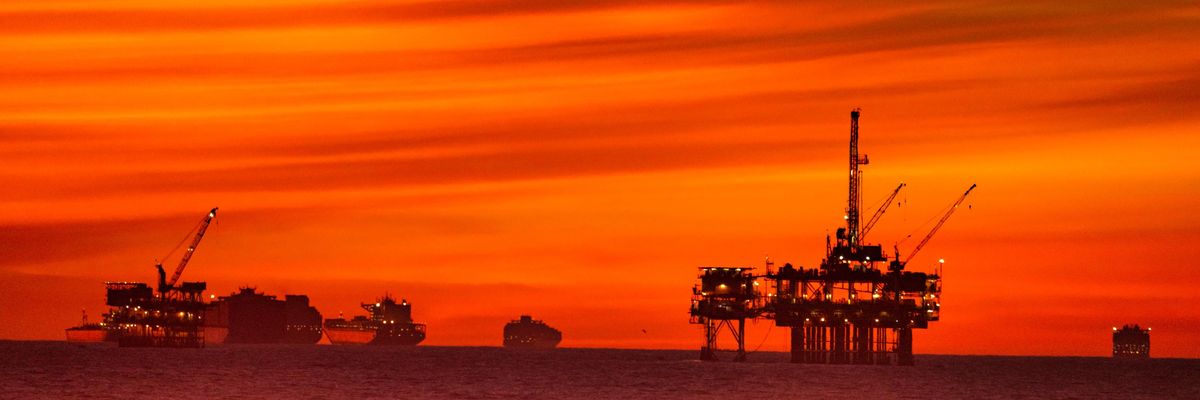
The sun sets over container ships and oil platforms off the coast of Huntington Beach, California on January 12, 2021. (Photo: Leonard Ortiz/MediaNews Group/Orange County Register via Getty Images)
To donate by check, phone, or other method, see our More Ways to Give page.

The sun sets over container ships and oil platforms off the coast of Huntington Beach, California on January 12, 2021. (Photo: Leonard Ortiz/MediaNews Group/Orange County Register via Getty Images)
Declaring that "cash comes from our legacy business," the CEO of Royal Dutch Shell has asserted that continuing the company's oil operations is necessary to help it transition away from non-oil energy operations.
Ben van Beurden made the remarks in an interview with the BBC published online Thursday.
"If we have to build a hydrogen plant from a wind farm that we build in the North Sea for a billion dollars, that is not going to be funded by a hydrogen business--it will be funded by the oil and gas business," van Beurden told the outlet.
The executive also pushed back against climate activists' demands, as well as scientific studies and international warnings, against pursuing new oil fields--like the proposed extraction in the Cambo oilfield off the coast of Scotland.
"Why would you say: Let's not get our oil and gas demands from our own resources but let's import from somewhere else, probably with a larger carbon footprint," he said, adding that such a move "also will not help the carbon footprint of the world."
Van Beurden made similar comments at an energy conference last month.
"Upstream, integrated gas, and the mature businesses like marketing and chemicals, they have to provide the cash for the future," he said at the online Energy Intelligence Forum.
"Investing in these businesses is going to be needed to keep them the strong cash engines that they currently are," he said, adding that "upstream needs to be a strong cash engine into, and probably through, the 2030s, and we need to invest to keep it there."
Related Content

Those remarks came just a week before he was confronted at the TED Countdown forum in Edinburgh, Scotland by a local climate activist over his company's links to human rights abuses in Nigeria, pursuit of new fossil fuel operations, and its appeal of a May court ruling that said Shell must decrease its carbon emissions 45% by 2030.
"I hope you know that as the climate crisis gets more and more deadly, you will be to blame," said activist Lauren MacDonald.
BBC noted in its reporting that Shell "plans to spend four times as much on oil and gas development as on renewables next year." The company announced plans earlier this year to hit net zero emissions by 2050, with a reliance "heavily on carbon offsets"--a scheme climate activists denounce as harmful greenwashing.
Trump and Musk are on an unconstitutional rampage, aiming for virtually every corner of the federal government. These two right-wing billionaires are targeting nurses, scientists, teachers, daycare providers, judges, veterans, air traffic controllers, and nuclear safety inspectors. No one is safe. The food stamps program, Social Security, Medicare, and Medicaid are next. It’s an unprecedented disaster and a five-alarm fire, but there will be a reckoning. The people did not vote for this. The American people do not want this dystopian hellscape that hides behind claims of “efficiency.” Still, in reality, it is all a giveaway to corporate interests and the libertarian dreams of far-right oligarchs like Musk. Common Dreams is playing a vital role by reporting day and night on this orgy of corruption and greed, as well as what everyday people can do to organize and fight back. As a people-powered nonprofit news outlet, we cover issues the corporate media never will, but we can only continue with our readers’ support. |
Declaring that "cash comes from our legacy business," the CEO of Royal Dutch Shell has asserted that continuing the company's oil operations is necessary to help it transition away from non-oil energy operations.
Ben van Beurden made the remarks in an interview with the BBC published online Thursday.
"If we have to build a hydrogen plant from a wind farm that we build in the North Sea for a billion dollars, that is not going to be funded by a hydrogen business--it will be funded by the oil and gas business," van Beurden told the outlet.
The executive also pushed back against climate activists' demands, as well as scientific studies and international warnings, against pursuing new oil fields--like the proposed extraction in the Cambo oilfield off the coast of Scotland.
"Why would you say: Let's not get our oil and gas demands from our own resources but let's import from somewhere else, probably with a larger carbon footprint," he said, adding that such a move "also will not help the carbon footprint of the world."
Van Beurden made similar comments at an energy conference last month.
"Upstream, integrated gas, and the mature businesses like marketing and chemicals, they have to provide the cash for the future," he said at the online Energy Intelligence Forum.
"Investing in these businesses is going to be needed to keep them the strong cash engines that they currently are," he said, adding that "upstream needs to be a strong cash engine into, and probably through, the 2030s, and we need to invest to keep it there."
Related Content

Those remarks came just a week before he was confronted at the TED Countdown forum in Edinburgh, Scotland by a local climate activist over his company's links to human rights abuses in Nigeria, pursuit of new fossil fuel operations, and its appeal of a May court ruling that said Shell must decrease its carbon emissions 45% by 2030.
"I hope you know that as the climate crisis gets more and more deadly, you will be to blame," said activist Lauren MacDonald.
BBC noted in its reporting that Shell "plans to spend four times as much on oil and gas development as on renewables next year." The company announced plans earlier this year to hit net zero emissions by 2050, with a reliance "heavily on carbon offsets"--a scheme climate activists denounce as harmful greenwashing.
Declaring that "cash comes from our legacy business," the CEO of Royal Dutch Shell has asserted that continuing the company's oil operations is necessary to help it transition away from non-oil energy operations.
Ben van Beurden made the remarks in an interview with the BBC published online Thursday.
"If we have to build a hydrogen plant from a wind farm that we build in the North Sea for a billion dollars, that is not going to be funded by a hydrogen business--it will be funded by the oil and gas business," van Beurden told the outlet.
The executive also pushed back against climate activists' demands, as well as scientific studies and international warnings, against pursuing new oil fields--like the proposed extraction in the Cambo oilfield off the coast of Scotland.
"Why would you say: Let's not get our oil and gas demands from our own resources but let's import from somewhere else, probably with a larger carbon footprint," he said, adding that such a move "also will not help the carbon footprint of the world."
Van Beurden made similar comments at an energy conference last month.
"Upstream, integrated gas, and the mature businesses like marketing and chemicals, they have to provide the cash for the future," he said at the online Energy Intelligence Forum.
"Investing in these businesses is going to be needed to keep them the strong cash engines that they currently are," he said, adding that "upstream needs to be a strong cash engine into, and probably through, the 2030s, and we need to invest to keep it there."
Related Content

Those remarks came just a week before he was confronted at the TED Countdown forum in Edinburgh, Scotland by a local climate activist over his company's links to human rights abuses in Nigeria, pursuit of new fossil fuel operations, and its appeal of a May court ruling that said Shell must decrease its carbon emissions 45% by 2030.
"I hope you know that as the climate crisis gets more and more deadly, you will be to blame," said activist Lauren MacDonald.
BBC noted in its reporting that Shell "plans to spend four times as much on oil and gas development as on renewables next year." The company announced plans earlier this year to hit net zero emissions by 2050, with a reliance "heavily on carbon offsets"--a scheme climate activists denounce as harmful greenwashing.